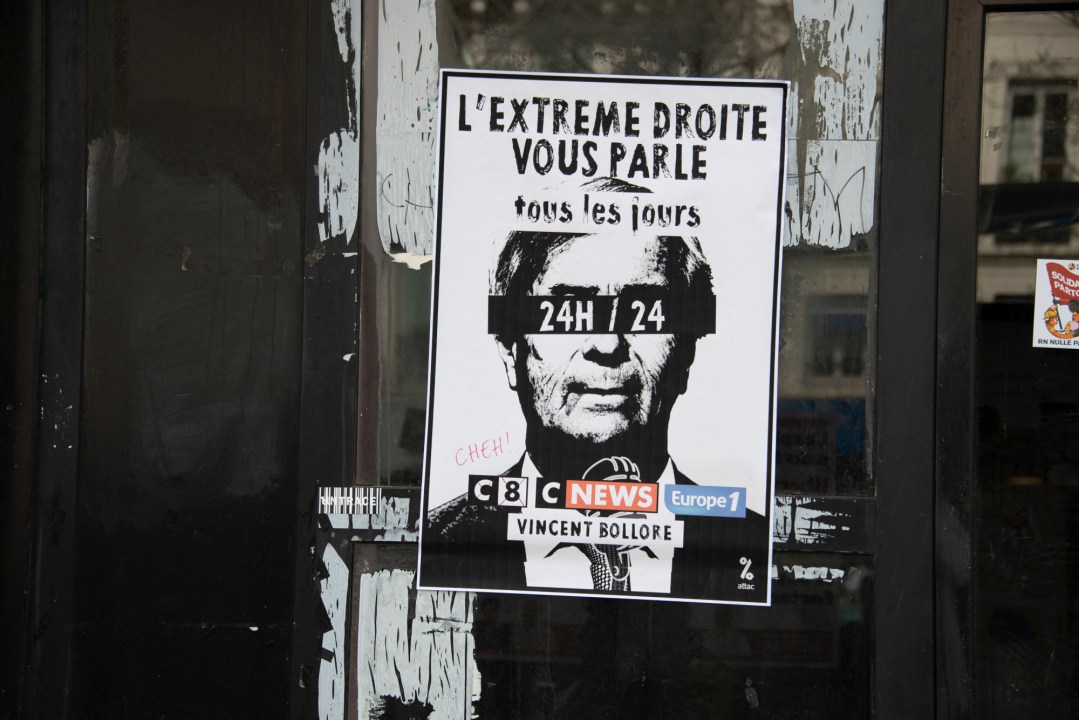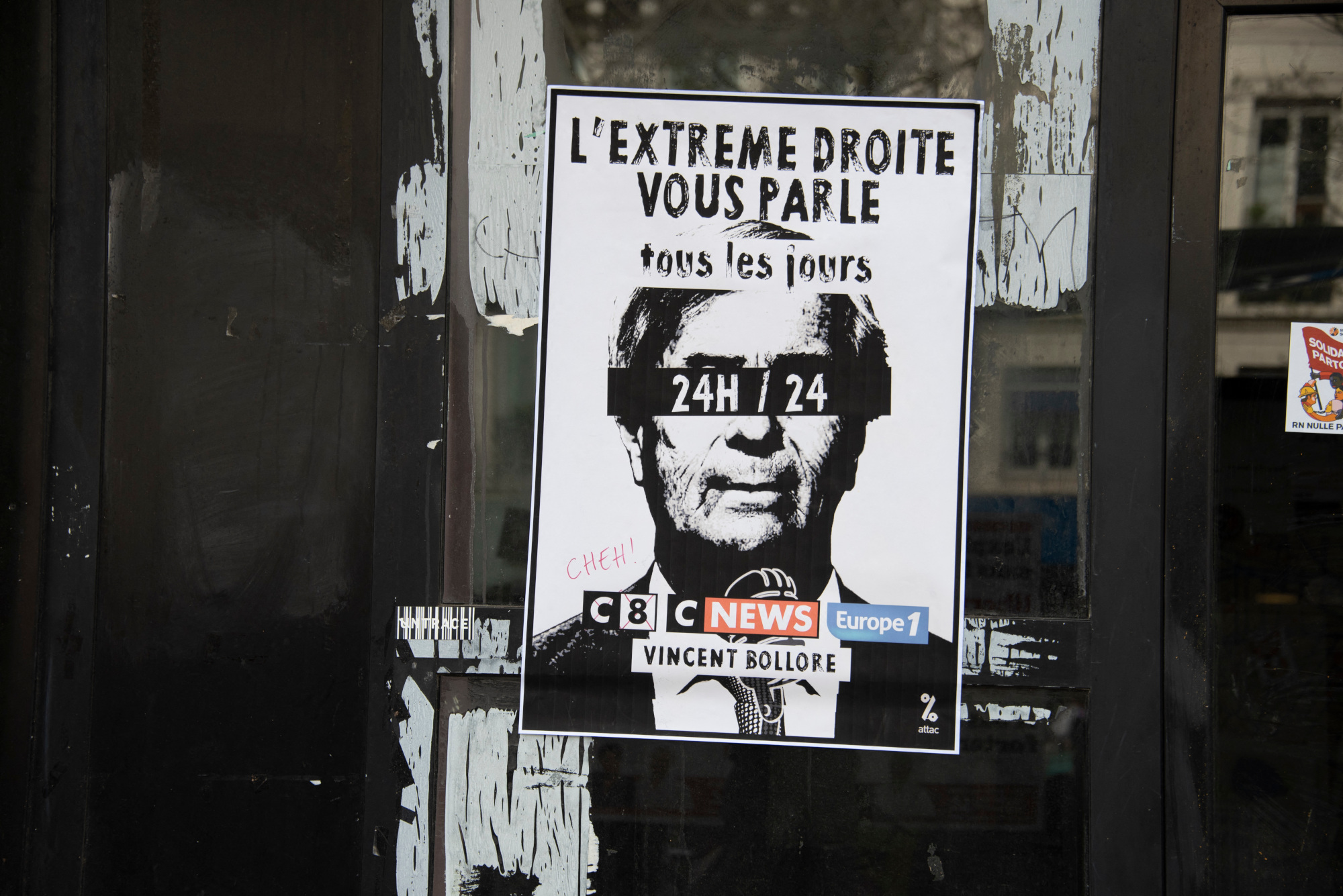France’s media regulator, Arcom, has been asked to investigate the right-leaning news channel CNews over its coverage of Marine Le Pen’s conviction this week. The 24-hour news channel is accused of being too one-sided, too sympathetic to Le Pen, and too critical of the judiciary in its editorial response to the decision that knocked her out of the presidential race.
On Monday, Marine Le Pen was convicted by the Paris Criminal Court of misusing European Parliament funds – a four-year sentence, with two years suspended and two years with an ankle tag, a €100,000 fine (around £85,000) – and a five-year ban from holding public office which came immediately into effect. Within 48 hours, Arcom, France’s broadcasting regulator, confirmed it had received multiple formal complaints about CNews.
CNews’s coverage of the verdict on Monday night may have hit the highest viewership metrics since it started in 2017, outperforming all competitors. The verdict dominated the evening’s programming, with extended analysis, panel discussion, and repeated framing of the court’s decision as a politically charged attack on France’s leading opposition figure.
CNews is not a fringe outlet. It is now the most-watched national news channel in France, regularly beating legacy broadcasters like BFMTV and France Info in prime time. Its influence is considerable – particularly among the electorate that forms the backbone of Le Pen’s support.
Under French media law, television channels aren’t free to take sides. French Digital Terrestrial Television broadcasters like CNews must adhere to strict legal mandates of ‘pluralism’ and ‘honesty’, leaving little room for editorial lines that deviate sharply from the state’s view of what is balanced. Breach that line, and the state can and will take you off the air.
Arcom is now looking at whether CNews crossed the line in its coverage of the Le Pen affair. The particular focus is on a segment aired on Monday evening, the evening of the Le Pen court decision, in which the channel featured a string of viewer reactions expressing outrage over the ruling. On-air panellists suggested the verdict was politically timed and judicially questionable. One guest described it flatly as a ‘judicial coup d’état.’
The CNews coverage was not criticism of a routine court judgment. It was a response to a politically explosive ruling by a first-instance magistrate that removed the leading opposition candidate from the 2027 presidential race – a move with profound national and indeed international consequences. It sounds incredible to have to say it, but in any functioning democracy the media’s role is to question and scrutinise such decisions. Yet CNews is now set to be investigated simply for doing so too forcefully. The underlying message is clear – challenge the system and the system will come for you.
The complaints have not just come from private citizens. Aurélien Saintoul, an MP from Jean-Luc Mélenchon’s La France Insoumise (LFI), has formally lodged a formal complaint against the channel, accusing CNews of acting as ‘an auxiliary of the far right.’ He singled out Pascal Praud, the network’s most combative presenter, for framing the Le Pen case as persecution rather than prosecution – a narrative that, according to Saintoul, violated basic standards of neutrality. In his statement, Saintoul said CNews was ‘rushing to the aid of Marine Le Pen’ by airing testimonies ‘modelled on far-right talking points,’ and accused the channel of transforming its programming into an ‘instrument of propaganda.’
The head of Arcom was appointed directly by President Macron. Sanctions could range from a formal warning to financial penalties and ultimately a refusal to renew the broadcaster’s licence.
The regulator has previously fined CNews for a number of breaches: one for failing to challenge a guest’s claim during a December 2023 debate that ‘immigration kills’ – a statement aired without counterargument from the host or panel – and another for allowing an unchallenged denial of human-driven climate change in August 2023. In the Le Pen case, Arcom might similarly question whether CNews excluded pro-judiciary perspectives entirely, such as voices defending the Paris Criminal Court, or that CNews allegedly misrepresented the verdict’s basis, for instance by framing it solely as political retribution rather than a legal outcome tied to documented misuse of EU funds. In regard to the Le Pen decision, the regulator will be looking whether CNews amplified a one-sided narrative, crossing Arcom’s line on pluralism and ‘honesty’.
This isn’t Arcom’s first run-in with the Vincent Bolloré media empire, which owns CNews and its sister channel, C8 – a general-interest entertainment channel best known for its loud, populist talk show TPMP. Bolloré, a conservative billionaire industrialist, has become one of the most powerful figures in French media, using his influence to reshape the broadcasting landscape through acquisitions and editorial realignments that critics say favour the populist right. He is the only French billionaire media mogul to stand up to the government. He doesn’t kowtow to President Macron and holds a refreshingly independent editorial line.
This climate of regulatory and political pressure against CNews was already the subject of criticism in early 2024, when Jonathan Miller wrote in The Spectator that ‘journalists are out to censor the French GB News,’ referring to CNews and the efforts by both media activists and state institutions to curtail its editorial line. The pressure against CNews is now escalating.
In March 2025, Arcom refused to renew the broadcasting licence of CNews’s sister channel, C8, effectively ordering the channel off the air. The final decision followed repeated violations linked to the flagship talk show Touche Pas à Mon Poste, hosted by Cyril Hanouna. Hanouna, one of the most recognisable figures on French television, built TPMP into a ratings juggernaut by blending celebrity gossip, viewer call-ins, and increasingly combative political commentary. While the show initially focused on pop culture, it gradually morphed into a nightly platform for opinion, with Hanouna himself adopting a brash, populist persona that resonated with viewers in the suburbs and provinces. His critics accuse him of vulgarity and demagoguery; his fans see him as one of the few public figures who speaks plainly about issues others avoid – such as immigration, crime in the suburbs, and Islamist extremism.
With C8 already off air, the investigation into CNews now carries an entirely different weight. It is no longer just a question of editorial tone. It is a test case for how far the French state is prepared to go in putting pressure on broadcasters to fall in line.
The situation bears comparison with the UK, where Ofcom has repeatedly scrutinised GB News for alleged breaches of impartiality rules. But the British system still stops short of what we’re seeing in France: Ofcom still just fines, Arcom shuts down.
With C8 gone and CNews now under formal investigation over how it covered what is the biggest political story of the year, the attack on freedom of expression in France is escalating. The state is no longer content to regulate tone – it is now policing entire editorial lines. Channels that stray from approved narratives risk sanctions, silence, or closure. This is not media oversight, it’s media control.









Comments